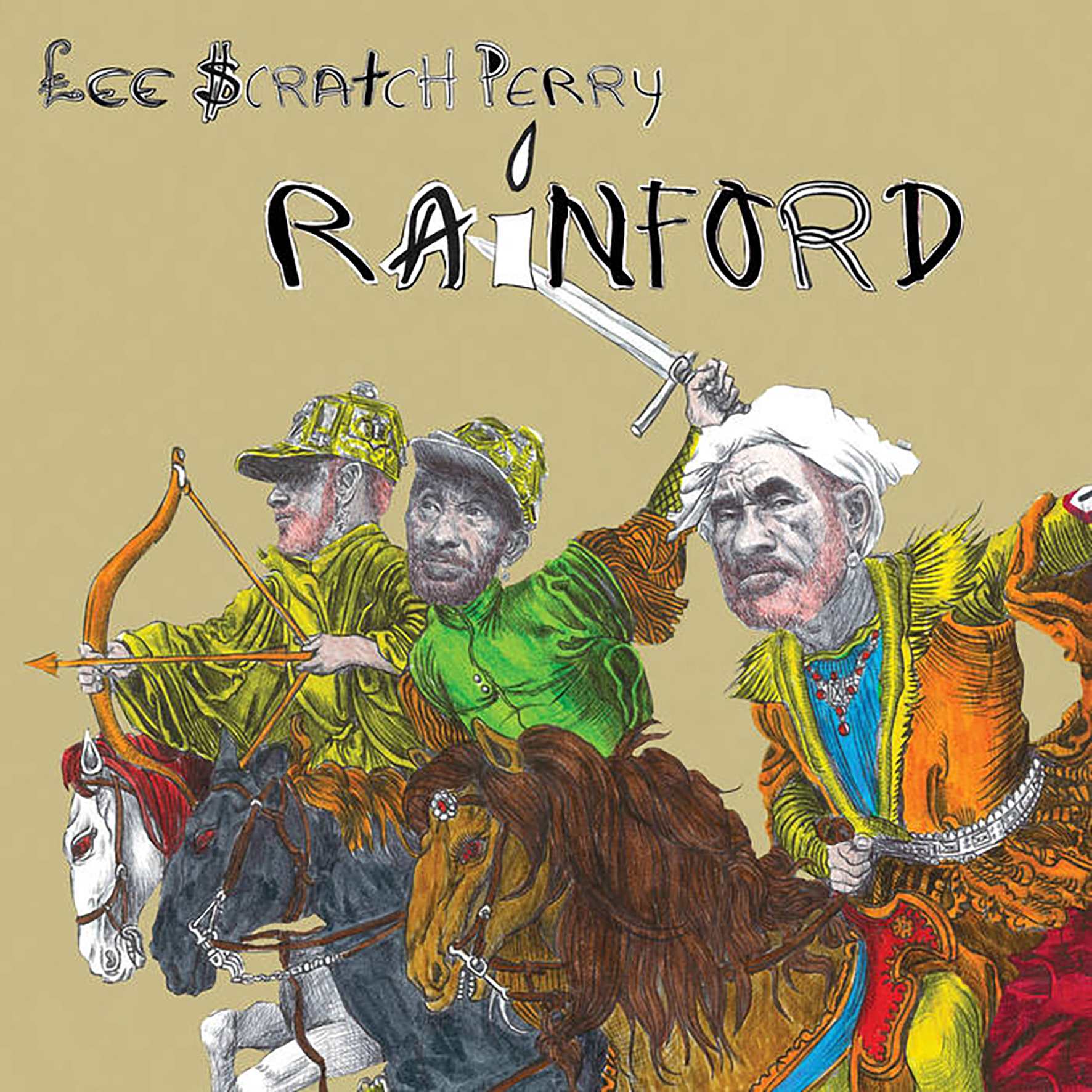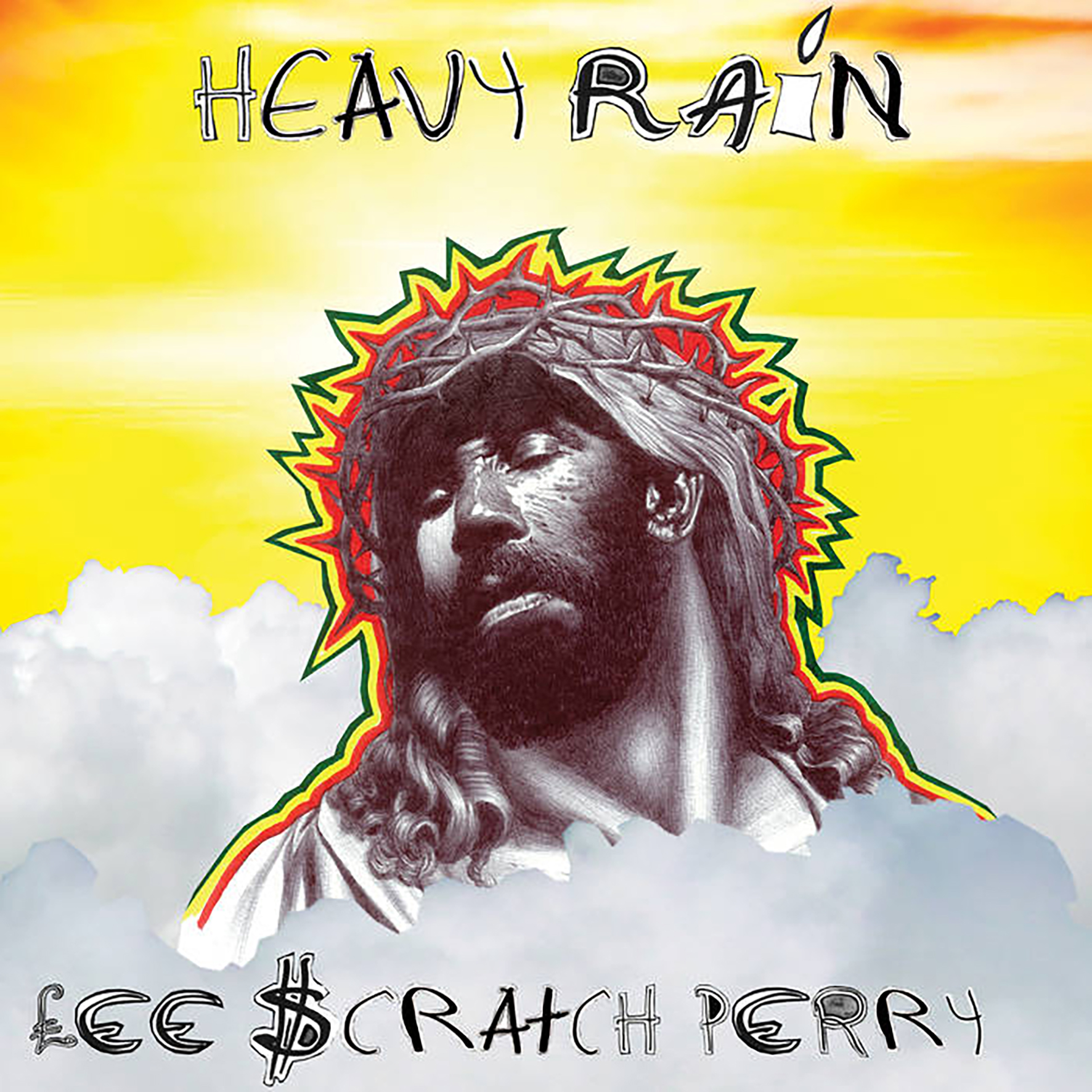 It is hard to overstate Lee "Scratch" Perry's influence on Jamaican music, hip-hop, and evolution of electronic music, as everyone who has ever used sampling or any dub-inspired production techniques is part of a continuum that he played a massive role in conjuring into being. For the most part, his most visionary work was recorded during the white-hot creative period in the '70s when Lee was obsessively recording at his Black Ark studio in Kingston, but his career after (allegedly) burning down his studio (to purge it of evil spirits) has objectively been a strange and erratic one with Perry embracing a sort of cosmic jester persona. He has always remained a boldly original thinker, however, and has continued to fitfully release some fine albums whenever he finds a sympathetic foil. One of the earliest artists to fill that role in Perry's post-Black Ark era was Adrian Sherwood for 1987's Time Boom X De Devil Dead (a union that was reprised two decades later with The Mighty Upsetter). With Rainford and its dub companion Heavy Rain, those two dub heavyweights are reunited once again (and at a time when both artists are experiencing a bit of a well-deserved renaissance). Both albums boast their share of killer material, but Heavy Rain is the more focused and uniformly strong of the pair.
It is hard to overstate Lee "Scratch" Perry's influence on Jamaican music, hip-hop, and evolution of electronic music, as everyone who has ever used sampling or any dub-inspired production techniques is part of a continuum that he played a massive role in conjuring into being. For the most part, his most visionary work was recorded during the white-hot creative period in the '70s when Lee was obsessively recording at his Black Ark studio in Kingston, but his career after (allegedly) burning down his studio (to purge it of evil spirits) has objectively been a strange and erratic one with Perry embracing a sort of cosmic jester persona. He has always remained a boldly original thinker, however, and has continued to fitfully release some fine albums whenever he finds a sympathetic foil. One of the earliest artists to fill that role in Perry's post-Black Ark era was Adrian Sherwood for 1987's Time Boom X De Devil Dead (a union that was reprised two decades later with The Mighty Upsetter). With Rainford and its dub companion Heavy Rain, those two dub heavyweights are reunited once again (and at a time when both artists are experiencing a bit of a well-deserved renaissance). Both albums boast their share of killer material, but Heavy Rain is the more focused and uniformly strong of the pair.
Rainford (Perry’s given first name) is ostensibly an entirely song-based album, but it is kind of a stretch to describe late-period Perry's spontaneous-sounding stream-of-consciousness vocalizing as anything resembling conventional songcraft.Nevertheless, it is quite fun to imagine him accumulating a mountain of crumpled papers as he struggles to rewrite lines like "reggae on the moon, super ape on the moon" until they convey exactly the nuanced meaning that he intended (embellished with jabbering animal noises, of course).It would be more apt to say that Perry instead delivers some spirited vocal performances over a series of solid grooves provided by a large cast of On-U Sound/Dub Syndicate luminaries and associates.That said, there are actual choruses for several pieces that feature hooks sung by Denise Sherwood Devenish and Emily Sherwood Hyman (Adrian's daughters).As such, Rainford is both a family affair and an On-U Sound all-star celebration.It is appropriate then that Rainford often has the feel of a party album, albeit quite an amusingly off-kilter one.For example, the laid-back ska groove of "House of Angels" could fit quite seamlessly into any beach party scene from a spring break-themed '80s movie.Elsewhere, the playfully deranged "Makumba Rock" resembles a gleefully hallucinatory and dub-damaged dance party in a deep jungle.Perry, unsurprisingly, is at his most animated and unhinged throughout that piece, fake-sobbing and periodically pleading for his mommy (presumably because the party is simply too crazy even for him).Amidst all the lunacy, however, there are some very cool and unexpected twists, as Samia Farah contributes some jazzy vocal flourishes and Sherwood increasingly warps the groove into a whooshing, sci-fi mindfuck. 
The rest of the album is a bit of a mixed bag, as Perry's characteristically erratic muse leads him to both some perplexing misfires (the overdramatic "Let it Rain" and the kooky "Cricket on the Moon") as well as a handful of legitimately inspired gems.Naturally, Sherwood and the assembled cast of UK reggae luminaries deserve a hell of a lot of credit for the latter themselves–particularly for the dub-wise slow-motion chug of "African Starship," which benefits from some absolutely delightful (and understated) flute, trumpet, and synth contributions. Notably, "African Starship" also features the multi-instrumental talents of Gaudi, who seems to bring out the best in Perry almost every time he appears.For example, Perry sounds like a wizened, melancholy prophet in the slow, heavy groove of "Children of the Light" and the piece's skittering dub flourishes, soulful melodica, and toy piano hooks elevate it to something approaching transcendence.Gaudi is not involved in "Kill Them Dreams Money Worshippers" or the closing "Autobiography of an Upsetter," however, and that pair round out an unexpectedly near-perfect run of songs on the album’s second half.Admittedly, "Kill Them Dreams" feels like a bit of an anachronism, resembling an idiosyncratic would-be classic from the early '80s, but it is a good one and I am always on-board whenever anyone assures me that we are about to have a black magic party."Autobiography," on the other hand, is exactly what the title promises, as Perry tenderly looks back on his life over a squelchy reggae vamp that features a host of inspired vocal flourishes from guest Leigh Stephen Kenny.The "I am The Upsetter" vocal hook is an especially great touch.More than any other piece on the album, "Autobiography" captures Perry as his most endearing and human.Moments like those are what make Rainford a significant release, as the album occasionally reveal the deep soul and hard-earned wisdom that is usually concealed by Perry's penchant for eccentric antics and self-referential wordplay.
Samples can be found here.

In traditional Jamaican dub fashion, Heavy Rain deconstructs and reinvents most of the songs from Rainford to shift the emphasis away from the vocals and onto the groove.That said, there are also some welcome subtractions ("Let It Rain"), some great new additions, and some significant changes in the cast of characters involved.As such, it often has a very different tone than its original source material.
The biggest surprise is that Brian Eno turned up to help transform "Makumba Rock" into the relentlessly propulsive and spacey "Here Come The Warm Dreads."Elsewhere, former Skatalite Vin Gordon joins the party to enhance three pieces with some lazily smoldering trombone solos.Notably, one of those three pieces is quite an impressively radical reshaping of "Kill Them Dreams" (now "Rattling Bones and Crowns") that carves away all the "pop" touches to leave behind a sinuous and contemporary-sounding slab of heavy dub.In fact, almost all of Heavy Rain's enhancements are for the better, aside from perhaps a few questionable harmonica intrusions and the removal of all the crazy jungle sounds for "Makumba Rock."The new version of "Autobiography of an Upsetter" is not exactly an improvement either, but that is only because the original was just about perfect as is.That said, the more spacious and gently hallucinatory version of "Children of the Light" ("Enlightened") is every bit as good as the original.And all of the weaker pieces from Rainford seem considerably stronger in their newly altered form.For the most part, Heavy Rain unerringly excises or significantly downplays almost every element from Rainford that felt at all kitschy or retro.Also, the entirely new pieces are universally quite good (or at least endearingly weird, like the all-too-brief and awkwardly lurching "Hooligan Hank"). 
As was the case with Rainford, Gaudi's handful of appearances tend to correlate strongly with the album's best songs.In this case, that hot streak continues with a pair of killer new pieces: the slow, heady throb of "Dreams Come True" and the rolling, clattering "Mindworker."The latter also features an especially fiery vocal performance from Perry in full prophet mode, as he enigmatically rants about collecting souls, "transfigurating" minds, and ruling the night in the land of slime.Of course, it should be noted that Gaudi's efforts tend to stand out precisely because the rhythm section, the guitars, and the dubbed-out percussion flourishes of Adrian Sherwood are all fully absorbed in conjuring up the heavy, fluid grooves that form the backbone of everything.It is very easy to take participants like Crucial Tony, George Oban, and Style Scott for granted, as they have been making great reggae for so long that they make it seem totally effortless and organic.In other non-Gaudi news, "Above and Beyond" is still another unexpected new gem, as saxophonist Paul Booth and violinist Sami Bishai engage in dueling solos over a muscular, bass-heavy groove.
When all of those great moments are added up, they amount to a remarkably solid and very current-sounding outing for Perry, rounding out quite an impressive streak of strong 2019 collaborations (he also recorded with Peaking Lights and hip-hop producer Mr. Green).To some degree, it is not at all surprising that the dub companion to Rainford would be stronger than Rainford itself, as Perry has always been far more renowned for his imagination and his production skills than he has been for his singing.However, I was surprised that Rainford occasionally hit the higher highs of the two releases, as Perry's offbeat charisma is very hard to resist when he is focused and impassioned.While I sincerely doubt that there is anyone who expects the deeply idiosyncratic and unpredictable Perry to record a flawless album as an octogenarian, a legitimately strong case could be made that he did exactly that in a roundabout way: if the best songs from Rainford and the best songs from Heavy Rain were brought together, the resultant release would be every bit as good as many of Perry's more celebrated '70s releases.The only real difference is that Perry is now happily luxuriating in a genre that he created decades before rather than actively trying to pioneer and define a new one.
Samples can be found here.
Read More

